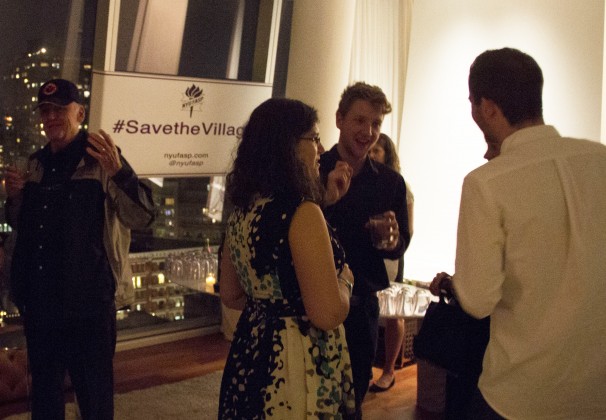
Faculty, politicians, Greenwich Village residents and several students gathered at The Standard hotel Oct. 8 for a fundraiser hosted by Faculty Against the Sexton Plan.
The event was intended to raise money for FASP’s fight against NYU 2031, also known as the Sexton Plan, an expansion project with a Core Plan that would develop 1.9 million square feet on two superblocks between West Third Street and West Houston Street.
“We’ve known all along that if the faculty stood shoulder to shoulder with the organized opposition to overdevelopment in the Village it would be very difficult to stop us,” Mark Crispin Miller, a professor of Media, Culture and Communication and a FASP representative, said. “NYU is trying to crush [the Village] under its own dead weight. We’re not going to let that happen.”
Miller said the event location, the penthouse of a 21-story hotel in the Village, was not a conflict of interest for FASP.
“The Sexton plan makes this look like look like a flatiron building,” he said. “And, we don’t want to see anymore hotels go up in the Village.”
Event tickets ranged from $100 to $5,000. The money raised is going toward FASP’s public relations campaign against the plan and a lawsuit against the city and state agencies that approved it.
Miller, representatives of NYU’s Student Labor Action Movement, Andrew Berman of the Greenwich Village Society for Historic Preservation, assemblywoman Deborah Glick and former mayoral candidate Sal Albanese gave speeches during the fundraiser. CAS doctoral student and teaching assistant Alex Manowitz and author Fran Lebowitz also spoke.
During his speech, Manowitz said the 2031 plan would exacerbate the problem of student debt at NYU. He also spoke about the union rights of graduate students and research assistants.
Lebowitz said that she does not like NYU and that students are tourists.
“When NYU builds a building or buys a building, that is a place where regular people, by which I mean adults, cannot live,” Lebowitz said in a speech.
The destruction of the Village was not the only concern of the event’s attendees. Miller said there is no academic rationale to the expansion plan.
“Most of the space they propose to build is not for labs and classrooms,” Miller said. “18 percent of the space in the first 10 years is for labs and classrooms. When the whole thing is done, it’s only 40 percent. The rest is dorms, retail outlets, recreational facilities and a completely needless faculty apartment building.”
According to NYU’s Core Project Fact Sheet, when the project is finished, 53 percent of the new space will be for academic use, 17 percent for student housing, 9 percent for athletic facilities, 6 percent for faculty housing, 7 percent for community space and 5 percent for retail and parking.
NYU spokesperson John Beckman said FASP is opposed to any realistic plan to expand the university’s available space and said that the faculty group known as the University Space Priorities Working Group is weighing the space issues in full.
“New academic space is vital for NYU to maintain its academic trajectory,” Beckman said.
“The conclusions in the Working Group’s interim report are delivered calmly and dispassionately, and they speak for themselves.”
On the FASP website, they discuss the current 2031 plan and provide an alternative proposal of repurposing space in other buildings near Washington Square.
“By its own account in the 2031 plan, NYU can meet its needs for academic space up to 2021 in existing spaces within 1/4 mile of the core,” the FASP’s website reads. “The university has 715,000 square feet planned for renovation and repurposing 730 Broadway and the newly acquired Forbes Building ”
The Working Group has not released their final recommendation to the university, which is expected in December.
A version of this article appeared in the Wednesday Oct. 9 print edition. Kevin Burns and Billy Richling are deputy news editors. Email them at news@nyunews.com.
